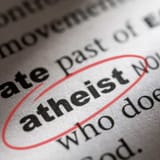Anonymous
6/12/2025, 5:42:05 AM No.40515573
I’m a theist! I think God exists, created the universe, fine-tuned the constants, made harmonious psychophysical laws, and loves you (yes you!) This is the single most awesome fact about the world!
But lots of people disagree with me about this. I like to think that my theism is rational, but maybe not. So to test how well I understand the best case for atheism, I thought I’d do my best to steelman atheism! I’ll describe the best reasons, in my judgment, to be an atheist as well as give my best responses to some of the theistic arguments I’ve promoted in the past. This is a rare glimpse of what an atheist Bentham’s Bulldog might look like—hope you enjoy!
2 The prior of God
When evaluating some theory about how the world is, we should look at two things. First, the prior probability of that theory: how likely it is before considering the evidence. The theory that I am cheating in poker has a higher probability than the theory that a fairy rigged the deck, even though they both can explain my extraordinary stream of luck. This is because its prior is higher. Next, one should look at the evidence—we’ll do that later.
I think God’s existence has an extremely low prior. Absurdly low!
There are infinite ways that the world could be. Infinite possible deities, sets of laws and initial conditions, and many more things too weird to grasp. The prior probability of any of these should be infinitesimal. When there are infinite possible options, you shouldn’t start out very confident in any of them.
Belief in God came largely out of ancient polytheistic belief—wherein people believed in many feuding deities like Zeus and Poseidon. Over time, belief in a bunch of feuding limited gods was replaced by belief in a single supreme God who calls the shots. But what are the odds that the random outshoot of ancient Paganism would happen to be the most intrinsically likely way for the world to be? It would be quite a miracle for such a thing to be true!
But lots of people disagree with me about this. I like to think that my theism is rational, but maybe not. So to test how well I understand the best case for atheism, I thought I’d do my best to steelman atheism! I’ll describe the best reasons, in my judgment, to be an atheist as well as give my best responses to some of the theistic arguments I’ve promoted in the past. This is a rare glimpse of what an atheist Bentham’s Bulldog might look like—hope you enjoy!
2 The prior of God
When evaluating some theory about how the world is, we should look at two things. First, the prior probability of that theory: how likely it is before considering the evidence. The theory that I am cheating in poker has a higher probability than the theory that a fairy rigged the deck, even though they both can explain my extraordinary stream of luck. This is because its prior is higher. Next, one should look at the evidence—we’ll do that later.
I think God’s existence has an extremely low prior. Absurdly low!
There are infinite ways that the world could be. Infinite possible deities, sets of laws and initial conditions, and many more things too weird to grasp. The prior probability of any of these should be infinitesimal. When there are infinite possible options, you shouldn’t start out very confident in any of them.
Belief in God came largely out of ancient polytheistic belief—wherein people believed in many feuding deities like Zeus and Poseidon. Over time, belief in a bunch of feuding limited gods was replaced by belief in a single supreme God who calls the shots. But what are the odds that the random outshoot of ancient Paganism would happen to be the most intrinsically likely way for the world to be? It would be quite a miracle for such a thing to be true!
Replies:




